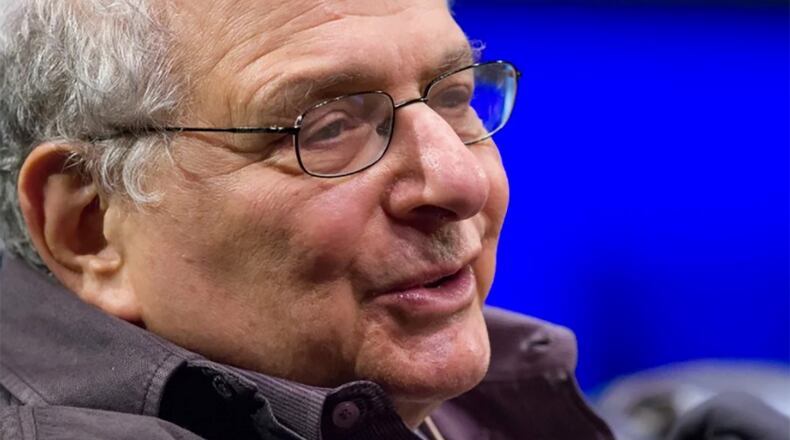Alfred Uhry, the chronicler of Atlanta life, left Atlanta on the first convenient train.
In another paradox, his plays, including the Pulitzer-winning “Driving Miss Daisy,” “The Last Night of Ballyhoo,” and “Parade,” captured Jewish life in Atlanta. But during his childhood in Atlanta, he wasn’t sure what being Jewish meant.
“When I was about 10 or 11, my parents took us to a Seder dinner at a friend’s house,” said Uhry this week, in a call from his Manhattan home. “It was sort of like going to dinner in Afghanistan. It was all very foreign to me and boring and strange.”
He concludes, “I don’t have those traditions in my bones like most people do. A lot of us were robbed. I’m not sure why.”
Uhry will discuss the double heritage of growing up Southern and Jewish on Sunday, Dec. 6, from 4-5:30 p.m., during a free online event sponsored by the Breman Museum. It is the first in a series of presentations called the Janice Rothschild Blumberg Lectures and is co-sponsored by The Temple and the Southern Jewish Historical Society.
The “lecture” part of that title makes Uhry nervous, especially the idea of delivering a dry monologue while sitting alone in front of a computer on the Upper West Side.
So, he agreed to a question and answer format, “and not just me sitting there looking at nobody.” Audience members of the Zoom presentation will be able to ask questions through the chat function.
Uhry’s life as an assimilated German Jew in a family that skipped most Jewish holidays but decorated a Christmas tree and held Easter egg hunts, is emblematic of the predicament of the Southern Jew.
Credit: AP
Credit: AP
Atlanta Jews often de-emphasized the qualities that set them apart in a bid to fit in. Then an event would occur — the Temple bombing, the lynching of Leo Frank — that made clear that some people perceive them as outsiders.
Uhry’s plays incorporate both of these murderous reckonings, but they also highlight the threads of human affection that stand in opposition to the violence.
He will likely speak about Leo Frank and his own connection to the case (his great-uncle owned the pencil factory where Frank was the manager and where Mary Phagan was murdered.)
He also may address the contemporary rise in anti-Semitism as white nationalists find allies among today’s politicians.
Yet Uhry, whose plays incorporate an optimistic thread, is hopeful about 21st century America.
Credit: AJC
Credit: AJC
“I’m not a political analyst,” said Uhry on Wednesday, the day before his 84th birthday, “but I think all this is a reaction to having Barack Obama become the president.
“If you look at the last 100 years,” he added, “things have moved to the left, compared to what people thought 100 years ago. This is just a little hiccup, from people who don’t want to realize being white is not being the boss of everything.”
Uhry used his own life as an example of our increasing comfort with differences in race and ethnicity.
“I’ve got a black nephew. I’ve got a Korean niece. I think the world is getting that way. I didn’t even know any Korean people when I was a kid.”
The issue of social status and “otherness” frequently crops up in Uhry’s work. “Ballyhoo,” set on the eve of World War II, explores the friction in Atlanta between third-generation German Jews who looked down on the more recently arrived Eastern European Jews.
The attitude was “cruel and unnecessary,” said Uhry, celebrating the fact that such enmity has mostly evaporated, and that Southern Jews feel more confident in their heritage.
“As far as I can see, in the present, most Jews, like my nephews and their families and their friends, are much more proud of being Jewish than we were raised to be, which I find very encouraging.”
Wistfully, he added, “I think it would be wonderful to be that proud all your life.”
“I loved the show,” said the Breman’s executive director Leslie Gordon, of “Ballyhoo.” During the 1996 Atlanta Olympics, Gordon was a producer with the Cultural Olympiad and programmed “Ballyhoo” as part of the city’s offerings.
“I thought it was fantastic,” she said. “It showed a part of the Jewish community that a lot of people aren’t aware of — that there are differences within the same community.”
Writing about your hometown often causes hurt feelings. “You have to have some guts to do it,” Uhry said. It also helps, he added, to have the encouragement of a world-renowned director, such as Harold Prince, who collaborated with Uhry on “Parade.”
“I had Hal Prince with his hand in the small of my back, pushing me along,”
Uhry’s Sunday appearance is free, but guests must register ahead of time at thebreman.org.
VIRTUAL EVENT
Janice Rothschild Blumberg Lecture
Keynote Speaker: Alfred Uhry
Stream via Zoom. 4-5:30 p.m., Dec. 6. Free, but registration required. thebreman.org/Janice-Rothschild-Blumberg-Lecture-Keynote-Speaker-Alfred-Uhry
About the Author
The Latest
Featured





